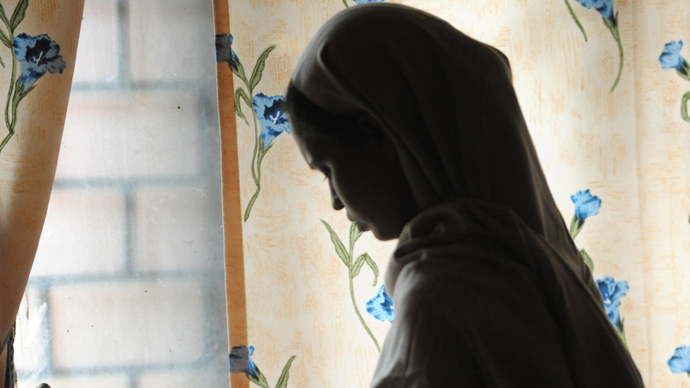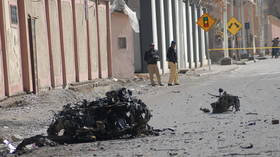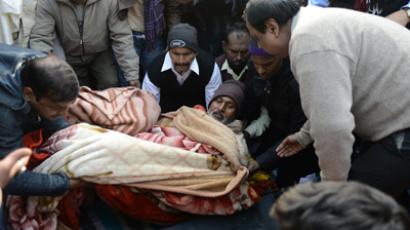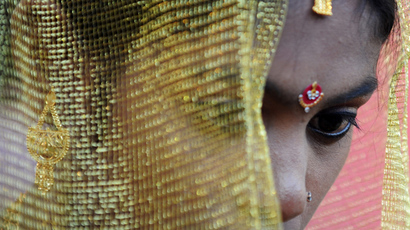‘Strip to prove you were raped,’ Indian police tell teen girl

A 14-year-old girl turned to police in India to file a rape complaint, but instead she was allegedly forced to strip in front of a senior police officer to convince him that her allegation of rape was genuine.
Earlier this week the teenager had gone to a police station in
Kushinagar, in the Indian state of Uttar Pradesh, with her
parents to file a report about her alleged rape by a local
resident. But the girl's father was allegedly asked to pay 50,000
rupees ($800) to the police – to register the complaint and
arrest the accused.
After the man refused to pay, the senior officer asked the man’s
daughter to accompany him into a room where he locked the door
from inside and demanded that she strip for him to make sure she
was raped, The Times of India reported.
"He took me into a room and closed the door and asked me to
remove my clothes," the girl stated in her complaint. The
police officer also allegedly verbally abused the girl and her
parents and sent them away without filing a report.
The incident came out after the family filed a new complaint with
Kushinagar’s police superintendent, accusing the senior police
officer of demanding money and humiliating the girl. Only then
did the police finally take action and detained the accused, the
newspaper reported.
According to the National Crime Records Bureau, one woman is
raped every 20 minutes in India. The number of children raped has
increased by 336 percent in the past 10 years.
Studies reveal that women are more likely to report sex
crimes if female police officers are on duty. When they report
rape charges to male officers, they are often humiliated.
Compounding the problem, India has a much lower proportion of
female police officers than in other Asian countries. In New
Delhi, for instance, only 7 percent of police officers are women,
according to The Times of India.
The average waiting time for the judiciary to try a rape case in
India is over 600 days, with many cases taking five to 10 years
to complete. As of March 2013, 24,000 cases of sexual assault
were pending before state High Courts and the Supreme Court of
India.

On top of this, according to The Hindu, India’s official source
of crime data, the National Crime Records Bureau, systematically
under-reports virtually all crime in India, due to a statistical
shortcoming.
For example, the country’s most high-profile rape case, the gang
rape and murder of a 23-year-old medical student in New Delhi in
December, which prompted new examination of data on sexual
assault in the country, doesn’t even figure in NCRB data on rape.
As has been confirmed to the newspaper by the NCRB deputy
director, the data published by the Bureau takes into account
only the “principal offence” in every First Information Report
(FIR), i.e., the charge that attracts the maximum penalty. When
rapes result in murder, such as the New Delhi gang rape case, the
principal offence is murder, because it carries a maximum death
penalty.
In the New Delhi gang-rape case, the young woman was attacked by
a group of men on a night bus and later died of her injuries at a
Singapore hospital. The crime prompted a massive wave of
anti-rape protests across the country, as thousands of people,
including women lawmakers, called for action from the authorities
to protect women and more vigorously prosecute rape cases.
Earlier this month, an Indian court sentenced four men to death
by hanging for the rape and murder of the young woman. The
sentence has to be confirmed by the Indian High Court before it
can be carried out. The men may appeal to the High Court and ask
for clemency from the president.
After previously appealing for a lighter sentence, defense
lawyers said that if hanging the men prevents further incidents
of rape in the country, they might choose not to appeal the
ruling in the High Court.
A survey conducted by Trust Law showed that India is the world’s
fourth-worst country for violence against women, behind only
Afghanistan, the Congo and Pakistan. India was ranked the worst
out of the G20 nations as it had abuse, violence, and murder on
scales unparalleled in the other G20 nations, with reasons behind
this including high rates of forms of slavery and exploitation. A
cult of masculinity is an essential part of Indian culture. Young
men often bully their wives through sexual violence, blaming
women for their own unemployment and other misfortunes, resorting
to violence and rape in revenge. One woman allegedly dies every
hour in dowry-related crimes in India, with over 8,000 such
deaths officially reported in 2012.
Nearly 31,000 violent crimes against women were reported in 2012
in the state of West Bengal, the highest in the country – a
figure that accounts for 12.67 percent of the total crime
committed against women in India. The irony is that the state is
ruled by a woman chief minister, India Today reported.
In June, police in eastern India detained 13 members of a women’s
rights group as they staged a protest to raise awareness of
violence against women and lack of police protection. The
protesters were outraged by two similar incidents that occurred
in June: the gang rape and murder of a 20-year-old college
student in West Bengal's North 24 Parganas district in June, and
that of a 14-year-old girl, who was gang-raped and killed by one
of her neighbors when she was returning from school in the town
of Gede.
In the final two months of 2012, the International Centre for
Research on Women conducted a survey amongst New Delhi residents
to find out their attitudes toward sexual violence. 95 percent of
the female respondents reported feeling unsafe in public, due to
the perceived threat of sexual violence against women, while 75
percent of male respondents said “women provoke men by the way
they dress.”














